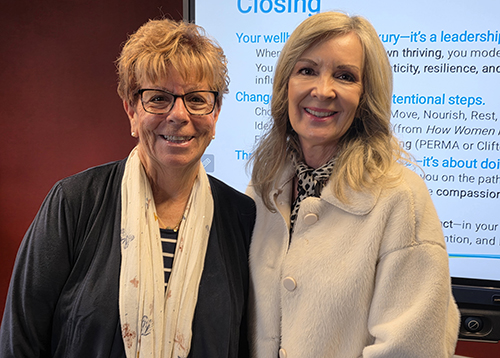By Willa de Ruyter
During a recent Women Leaders in Conversation hosted at the Tshwane School of Business, world-renowned leadership master coach, Dr Peggy Marshall from the Global Coaching Network and the Institute of Coaching at Harvard, shared her insights and expertise on Thriving Beyond Striving: Leadership for Well-Being and Personal Fulfilment.
In introducing the speaker, Dr Tessie Herbst, facilitator for Academic Leadership Development, Executive Education as well as the Tshwane University of Technology’s (TUT) sought-after the Women in Leadership Programme, focusing on leadership development for women, said: “We often hear that leadership can be all about pushing forward, achieving goals and meeting expectations. But what if true leadership starts with the most important thing of all: taking care of ourselves? You cannot pour from an empty cup. How you treat and take care of yourself, shapes everything about your leadership - your well-being, your decisions, your relationships and ultimately your success.”
Dr Marshall echoed this sentiment throughout her presentation: “Well-being is not just a luxury, it is a responsibility - a responsibility to ourselves and the people we lead.”

Drs Peggy Marshall and Tessie Herbst.
Dr Marshall has spent her career not just coaching individuals, but truly transforming the way leaders think about well-being. A master coach with fellowships from The Global Coaching Network and The Institute of Coaching at Harvard, Dr Marshall has coached some of the highest-level executives and organisations worldwide. But she doesn’t just teach coaching - she has shaped its future through leadership roles in national and international coaching organisations.
Her work extends across the globe, from South Africa to Europe and the USA. Her approach is all about human-centred leadership that creates environments where individuals and teams thrive, even amidst complexity and uncertainty. Her deep commitment to helping people lead with clarity, confidence and purpose is exactly what we need in today’s fast-paced world.
Before handing the floor to Dr Marshall, Dr Herbst also shared a few key research findings to set the stage for day’s discussion on well-being for women leaders.
“While we are undeniably the most educated, empowered, and accomplished generation of women in history, studies are showing a stark contrast when it comes to our happiness and well-being. Despite all the progress we have made in both our professional and personal lives, many of us are feeling more isolated, more stressed and more unhappy than ever before. We are seeing rising rates of depression, anxiety and loneliness among women, with more of us struggling to find balance and fulfilment, even though we have more opportunities than any generation before us. According to the Centers for Disease Control and Prevention (CDC), as of 2023, approximately 15% of women aged 18 and over reported taking a prescription medication for depression, compared to 7.4% of men. These statistics do not consider those of us who feel unhappy and unfulfilled but are not on antidepressants,” Dr Herbst said.
According to her, it is interesting to note that, while men, too, face their own set of challenges, studies consistently show that they are experiencing lower rates of mental health struggles and loneliness compared to women. “In fact, men report higher levels of life satisfaction, possibly due to different social expectations and support structures, which highlights the unique pressures and burdens women are carrying in today’s world,” she added.
“These statistics underscore the critical need for women leaders to prioritize their well-being. With this in mind, it’s clear that our leadership journey as women isn’t just about striving for success - it is about thriving in a way that is sustainable, fulfilling and grounded in well-being,” Dr Herbst said.
Dr Marshall’s hands-on approach to leadership coaching seamlessly brings together the theory and practice, ensuring that attendees really engage with and internalise the content of her workshops. During the three-hour long session, she touched on habits for well-being, habits for work-life balance, habits that hold us back and the five resets to reignite our personal and work lives.
In closing, Dr Marshall implored attendees to remember:
- Your well being is not a luxury – it is a leadership strategy. When you prioritize your own thriving, you model what’s possible for others. You create space for authenticity, resilience and courage – for yourself and those you influence.
- Change begins with small, intentional steps. Choose one reset, identify one habit to release and focus on one pillar of well-being to nurture every week.
- Thriving is not about doing more – it is about doing what matters most. What will fill your cup and sustain you on the path ahead. How can you offer yourself the same compassion and care you extend to others.
- Your presence matters. When you thrive, you amplify your impact – in your work, relationships and in community.
“You are worthy of the same energy, attention and love that you so often give away,” Dr Marshall concluded.
